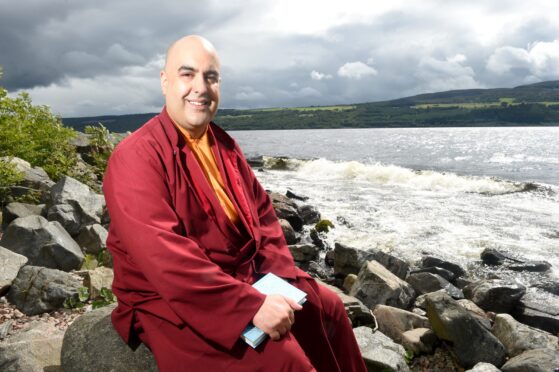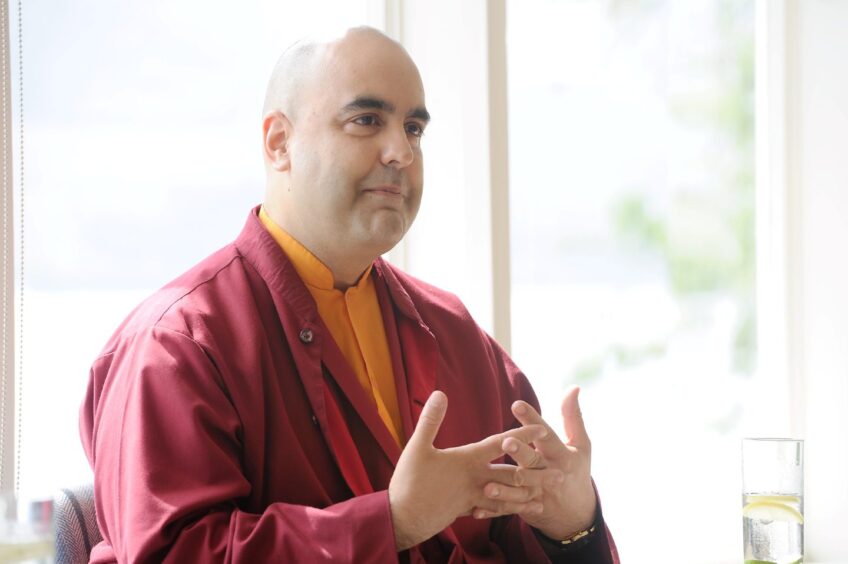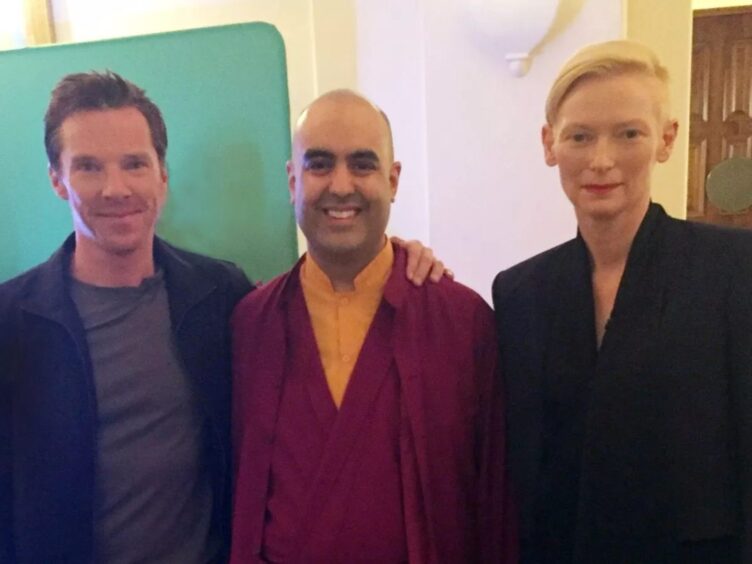
When Gelong Thubten set out to write A Handbook for Hard Times, he could not have foreseen how swiftly and unexpectedly his subject matter would become his reality.
The Buddhist monk, who trained at the Samye Ling monastery in the Scottish Borders, had just started working on his guide to meditation, a follow-up to his 2019 book A Monk’s Guide to Happiness, when he fell ill with Covid-19 during the early days of the pandemic.
“I wanted to address the idea of unhappiness, suffering and pain and how to deal with those creatively through meditation. Learning how to face hardship in a way that can help us grow,” said Thubten, 51, who is originally from Oxford.
“Then, ironically, I was hit very badly with Covid in March 2020. I was very sick for a long time and ended up with Long Covid, which had me flattened for about two years. I only really managed to get back to writing about a year ago, so those two years of illness were like research for the book.”
Buddhism helped me mentally survive Long Covid
He says the skills he learned through practising Buddhism, particularly meditation, helped him through his initial illness and lengthy recovery process.
“I was in a remote place so it was hard to get help and the breathlessness was quite distressing,” he explained. “Meditation helped me survive that by making me a little more relaxed which helped me breathe more easily.
“It also helped me cope with the fatigue and breathlessness I had with Long Covid. Meditation allows you to reframe your attitude so I see that period of illness as a helpful learning experience.
“Everything can be turned to the good if you work at it in your mind. Meditation has helped me enormously in that respect so I want to share simple tools with people so that they can get some benefit too.”
A monk of 30 years, Thubten spends much of his time away from Samye Ling but still considers it his spiritual home.
He has helped set up Samye Ling centres in Wales and Yorkshire and also often works from London, teaching people in different settings the techniques and benefits of meditation.
His new book aims to give readers the tools to overcome adversity and embrace inner peace and positivity. He believes it’s a skillset especially needed today.
“We’re living in a time when stress levels are really high and everything feels so uncertain and unsettled. Meditation is an amazing tool for helping to balance the mind and control our thoughts and emotions.
“Hard times keep turning up in different guises, from a pandemic to the cost of living crisis to all the seemingly constant stresses and strains of everyday life. I wanted to give people a sense of how they can become more fearless and courageous by training the mind so you can handle things better.”
Finding purpose at Samye Ling
Thubten first visited Samye Ling when he was 21, following a dramatic burnout while in New York trying to make it as an actor. He recalled: “I was burning the candle at both ends, wild partying but I was also very unhappy and experiencing panic attacks and episodes of depression.
“It built up into a massive and sudden burnout. I was bedridden for a few months and started reading my mum’s books on meditation.
“Then I heard about a Buddhist monastery where you can be a monk for one year. My initial intention was to improve my health and mind and then return to my life in America but after that first year, and a nine-month solitary retreat, I realised this was the life I wanted.
“It took me in a completely different direction and I’m happy with how things turned out. I found a philosophy and way of training the mind that I found incredibly beneficial for myself, but also for others.”
Teaching Hollywood stars to meditate
Thubten’s life as a Samye Ling monk actually helped him come full circle when it brought him back to the film industry. The film company Marvel hired him as a meditation adviser on the set of the 2016 film, Doctor Strange, where he helped stars Benedict Cumberbatch and Tilda Swinton meditate between takes.
“I started out as an actor so it’s been nice to help actors learn meditation to enhance their craft and it was lovely to be part of the crew on Doctor Strange,” he said. “I was there to teach meditation to the actors, particularly Benedict and Tilda.
“We worked on set in between shots as a way of bringing them into a calm and more spiritual space, which was very important for their character development and their performance.
“Benedict had meditated before but Tilda was new to it. They’ve kept up the meditation and it’s been very important in their lives.”
As well as sharing his own experiences, Thubten’s inspirational and practical book explains how we can all benefit from Buddhist philosophy and meditation, and how to incorporate this into our daily lives. Thankfully, you don’t need to join a monastery or undertake a lengthy solitude retreat to master the technique.
“Meditation is accessible to everyone. You don’t have to become a Buddhist,” said Thubten. “Most of the talks I give are in places like hospitals, prisons, schools, businesses or universities, so I’m not there to promote Buddhism but to give people tools that will help them with their lives.
“When I first started meditating, I thought you were supposed to clear your mind. The more I tried, the more busy my mind became so I thought I was hopeless at it.
“I later realised it’s not about stopping your thoughts but rather gaining more authority over those thoughts and emotions so that you can be in the driving seat rather than being driven by them.”
“You don’t need to be a Buddhist monk to learn meditation”
While meditation requires practice, it’s worth persevering, says Thubten. He says learning to have self-compassion was important in turning his life around.
“Meditation definitely makes you stronger and able to handle things better. It gives you a way of developing more compassion for yourself and others,” he added.
“That’s so crucial when we live in judgmental, harsh times when people are constantly criticising each other, and people tend to feel bad about themselves. Compassion is needed more than ever.
“Above all, be kind to yourself. When we suffer, we often become very hard on ourselves. When I was experiencing depression, I used to feel so ashamed about how I felt. I was depressed about the depression.
“If you can help people learn to love themselves and be kinder to themselves, I think their lives and the world at large will become a much happier place.
“I’m not suggesting everyone should go off and be monks. The journey of personal transformation through meditation is available to anybody, whatever way one chooses to do it.”
A Handbook for Hard Times by Gelong Thubten published by Yellow Kite.
Micro-moments of mindfulness
Here, Gelong Thubten explains that you can never be too busy to practice meditation.
“I find happiness through little moments of mindfulness,” he says. “Throughout the day, I’ve taught myself how to be more present and enjoy the moment more. I try to practice moments of mindful awareness, even in busy stressful situations.
“This, to me, is a way to find happiness because you become stronger and more resilient, and able to stay more positive even in hard moments. That is happiness.
“You can’t control the world around you but if you can find inner happiness, you become more free and able to be in charge of your own happiness, rather than giving that power away to other people or the world.
“Bringing meditation into daily life is crucial. Try practicing micro-moments of mindfulness throughout the day, even in work or stressful situations. By integrating your meditation into your daily life you can stay on top of the build-up of stress in your body and mind. It becomes an easy habit to practice regularly alongside formal daily meditation.
“I know what it’s like to have an overloaded schedule but I also know what it’s like to bring mindfulness into that schedule and to see how things can change for the better.”

Enjoy the convenience of having The Sunday Post delivered as a digital ePaper straight to your smartphone, tablet or computer.
Subscribe for only £5.49 a month and enjoy all the benefits of the printed paper as a digital replica.
Subscribe © PRESS AND JOURNAL
© PRESS AND JOURNAL © SYSTEM
© SYSTEM